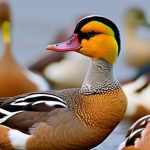The Nova Scotia Duck Tolling Retriever, also known as the Toller, is a medium-sized breed known for its distinctive red coat and playful nature. This breed is highly intelligent, energetic, and affectionate, making it a popular choice for families and active individuals. Tollers are known for their ability to lure ducks within shooting range for hunters, hence the name “tolling.” They are also excellent swimmers and retrievers, making them well-suited for waterfowl hunting. In addition to their hunting abilities, Tollers are also beloved companions and excel in various dog sports such as agility, obedience, and flyball.
Similar breeds to the Nova Scotia Duck Tolling Retriever include the Golden Retriever, Labrador Retriever, and the Australian Shepherd. These breeds share similar traits such as intelligence, loyalty, and a love for outdoor activities. While each breed has its own unique characteristics, they all make wonderful companions for active individuals and families who are looking for a loyal and energetic pet.
Table of Contents
- 1 History and Origins of the Nova Scotia Duck Tolling Retriever
- 2 Physical Characteristics and Temperament of the Nova Scotia Duck Tolling Retriever
- 3 Similar Breeds to the Nova Scotia Duck Tolling Retriever
- 4 Training and Exercise Needs of the Nova Scotia Duck Tolling Retriever and Similar Breeds
- 5 Common Health Issues in Nova Scotia Duck Tolling Retrievers and Similar Breeds
- 6 Choosing the Right Breed for Your Lifestyle and Family
- 7 FAQs
- 7.1 What are some similar breeds to the Nova Scotia Duck Tolling Retriever?
- 7.2 Are Nova Scotia Duck Tolling Retrievers good family pets?
- 7.3 Do Nova Scotia Duck Tolling Retrievers require a lot of exercise?
- 7.4 Are Nova Scotia Duck Tolling Retrievers easy to train?
- 7.5 Do Nova Scotia Duck Tolling Retrievers shed a lot?
Key Takeaways
- The Nova Scotia Duck Tolling Retriever is a medium-sized, intelligent, and energetic breed known for its ability to lure and retrieve waterfowl.
- The breed originated in the early 19th century in the Little River District of Nova Scotia, Canada, and is believed to be a mix of various retriever breeds, spaniels, and possibly some farm collie or setter.
- Nova Scotia Duck Tolling Retrievers are known for their distinctive red coat, webbed feet, and playful, affectionate, and high-energy temperament.
- Similar breeds to the Nova Scotia Duck Tolling Retriever include the Golden Retriever, Labrador Retriever, and the Australian Shepherd, all of which share similar intelligence, energy levels, and trainability.
- Training and exercise are essential for the Nova Scotia Duck Tolling Retriever and similar breeds, as they are highly intelligent and active dogs that require mental stimulation and physical activity to prevent boredom and destructive behaviors.
History and Origins of the Nova Scotia Duck Tolling Retriever
The Nova Scotia Duck Tolling Retriever originated in the early 19th century in the Little River District of Nova Scotia, Canada. The breed was developed by crossing various breeds including the Cocker Spaniel, Irish Setter, Labrador Retriever, and possibly the Chesapeake Bay Retriever. The goal was to create a versatile hunting dog that could lure and retrieve waterfowl in the Canadian marshes. The Toller’s unique hunting technique involves playing along the shoreline to attract the curiosity of ducks, causing them to swim closer within shooting range.
The breed was officially recognized by the Canadian Kennel Club in 1945 and by the American Kennel Club in 2003. Today, the Nova Scotia Duck Tolling Retriever is still used as a hunting companion but has also gained popularity as a beloved family pet and versatile working dog. Their intelligence, agility, and friendly nature have made them successful competitors in various dog sports and activities.
Physical Characteristics and Temperament of the Nova Scotia Duck Tolling Retriever
The Nova Scotia Duck Tolling Retriever is a medium-sized breed with a strong and muscular build. They have a distinctive red coat with white markings on the chest, feet, and tail tip. Their double coat is water-repellent, providing protection from the elements while working in the water. Tollers have a fox-like appearance with a broad skull, medium-sized ears, and a bushy tail carried high. They have an alert and intelligent expression that reflects their keen personality.
In terms of temperament, Tollers are known for being affectionate, energetic, and highly intelligent. They are loyal and devoted to their families, making them excellent companions for active individuals and families. Tollers are also known for their playful nature and love for outdoor activities. They thrive on mental and physical stimulation and require regular exercise to keep them happy and healthy. While they are friendly and outgoing with their family members, they can be reserved around strangers, making them excellent watchdogs.
Similar Breeds to the Nova Scotia Duck Tolling Retriever
The Golden Retriever is another popular breed known for its friendly and gentle temperament. Like the Toller, Golden Retrievers are intelligent, loyal, and excellent companions for families. They are also versatile working dogs and excel in various dog sports such as obedience, agility, and tracking. Golden Retrievers have a dense golden coat that is water-repellent, making them well-suited for outdoor activities and waterfowl hunting.
The Labrador Retriever is another similar breed known for its friendly and outgoing nature. Labs are highly intelligent, obedient, and eager to please, making them easy to train and great companions for families. They are also versatile working dogs used for hunting, search and rescue, and as service dogs. Labs have a short, dense coat that is water-resistant, allowing them to work in various weather conditions.
The Australian Shepherd is a herding breed known for its intelligence, agility, and strong work ethic. Aussies are highly energetic and require regular exercise and mental stimulation to keep them happy. They are also loyal and protective of their families, making them excellent watchdogs. Aussies have a medium-length coat that comes in various colors such as black, red merle, and blue merle.
Training and Exercise Needs of the Nova Scotia Duck Tolling Retriever and Similar Breeds
The Nova Scotia Duck Tolling Retriever is an intelligent breed that requires consistent training and mental stimulation. Positive reinforcement methods such as praise, treats, and play are effective in training Tollers. They are eager to please and enjoy learning new tasks, making them successful competitors in various dog sports such as agility, obedience, and flyball. Early socialization is also important to ensure that Tollers grow up to be well-rounded and confident adults.
In terms of exercise needs, Tollers are highly energetic and require regular physical activity to keep them happy and healthy. Daily walks, runs, or play sessions are essential to prevent boredom and destructive behaviors. They also enjoy swimming and retrieving games, which allow them to use their natural hunting instincts. Similar breeds such as the Golden Retriever, Labrador Retriever, and Australian Shepherd also require regular exercise and mental stimulation to thrive.
Common Health Issues in Nova Scotia Duck Tolling Retrievers and Similar Breeds

Like all breeds, the Nova Scotia Duck Tolling Retriever is prone to certain health issues that potential owners should be aware of. Some common health concerns in Tollers include hip dysplasia, progressive retinal atrophy (PRA), autoimmune disorders, and hypothyroidism. Regular veterinary check-ups, a balanced diet, regular exercise, and proper grooming can help prevent or manage these health issues.
Similarly, Golden Retrievers are prone to hip dysplasia, elbow dysplasia, cataracts, heart disease, and certain types of cancer. Labs are prone to obesity, hip dysplasia, elbow dysplasia, eye disorders, and exercise-induced collapse (EIC). Australian Shepherds may be prone to hip dysplasia, epilepsy, cataracts, and certain genetic disorders such as the MDR1 gene mutation.
Choosing the Right Breed for Your Lifestyle and Family
When choosing a breed that is right for your lifestyle and family, it’s important to consider factors such as energy level, exercise needs, grooming requirements, temperament, and potential health issues. The Nova Scotia Duck Tolling Retriever is best suited for active individuals or families who enjoy outdoor activities such as hiking, running, or swimming. They thrive on mental stimulation and require regular exercise to keep them happy.
Similarly, the Golden Retriever is an excellent choice for families who enjoy spending time outdoors and want a loyal and affectionate companion. Labs are also great family pets who thrive on companionship and regular exercise. Australian Shepherds are best suited for active individuals or families who can provide them with plenty of physical activity and mental stimulation.
In conclusion, the Nova Scotia Duck Tolling Retriever is a unique breed known for its intelligence, energy, and affectionate nature. Similar breeds such as the Golden Retriever, Labrador Retriever, and Australian Shepherd share similar traits and make wonderful companions for active individuals or families who enjoy spending time outdoors. It’s important to research each breed thoroughly to ensure that you choose a dog that fits your lifestyle and can provide them with the care they need to thrive.
If you’re interested in learning more about similar breeds to the Nova Scotia Duck Tolling Retriever, you might want to check out this article on PoultryWizard.com that discusses different breeds of ducks and their mating seasons. Understanding the characteristics and behaviors of various waterfowl can provide valuable insights for those considering adding a duck to their family. You can read the full article here.
FAQs
What are some similar breeds to the Nova Scotia Duck Tolling Retriever?
Some similar breeds to the Nova Scotia Duck Tolling Retriever include the Golden Retriever, Labrador Retriever, and the Australian Shepherd.
Are Nova Scotia Duck Tolling Retrievers good family pets?
Yes, Nova Scotia Duck Tolling Retrievers are known for being affectionate, intelligent, and good with children, making them great family pets.
Do Nova Scotia Duck Tolling Retrievers require a lot of exercise?
Yes, Nova Scotia Duck Tolling Retrievers are an active breed and require regular exercise to keep them happy and healthy. Daily walks, playtime, and mental stimulation are important for this breed.
Are Nova Scotia Duck Tolling Retrievers easy to train?
Yes, Nova Scotia Duck Tolling Retrievers are highly intelligent and eager to please, making them relatively easy to train. Consistent and positive reinforcement training methods work well with this breed.
Do Nova Scotia Duck Tolling Retrievers shed a lot?
Yes, Nova Scotia Duck Tolling Retrievers have a double coat that sheds seasonally, so regular grooming and brushing are necessary to manage their shedding.
Meet Walter, the feathered-friend fanatic of Florida! Nestled in the sunshine state, Walter struts through life with his feathered companions, clucking his way to happiness. With a coop that’s fancier than a five-star hotel, he’s the Don Juan of the chicken world. When he’s not teaching his hens to do the cha-cha, you’ll find him in a heated debate with his prized rooster, Sir Clucks-a-Lot. Walter’s poultry passion is no yolk; he’s the sunny-side-up guy you never knew you needed in your flock of friends!







